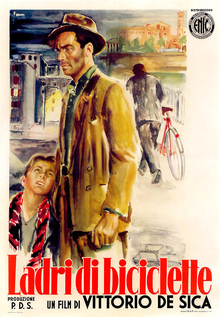| Bicycle Thieves | |
|---|---|
 Theatrical release poster | |
| Italian | Ladri di biciclette |
| Directed by | Vittorio De Sica |
| Screenplay by | |
| Story by | Cesare Zavattini |
| Based on | Bicycle Thieves by Luigi Bartolini |
| Produced by |
|
| Starring | |
| Cinematography | Carlo Montuori |
| Edited by | Eraldo Da Roma |
| Music by | Alessandro Cicognini |
Production company | Produzioni De Sica[2] |
| Distributed by | Ente Nazionale Industrie Cinematografiche |
Release date |
|
Running time | 89 minutes |
| Country | Italy |
| Language | Italian |
| Budget | $133,000[3] |
| Box office | $428,978[4] |
Bicycle Thieves (Italian: Ladri di biciclette), also known as The Bicycle Thief,[5] is a 1948 Italian neorealist drama film directed by Vittorio De Sica.[6] It follows the story of a poor father searching in post-World War II Rome for his stolen bicycle, without which he will lose the job which was to be the salvation of his young family.
Adapted for the screen by Cesare Zavattini from the 1946 novel by Luigi Bartolini, and starring Lamberto Maggiorani as the desperate father and Enzo Staiola as his plucky young son, Bicycle Thieves received an Academy Honorary Award (most outstanding foreign language film) in 1950, and in 1952 was deemed the greatest film of all time by Sight & Sound magazine's poll of filmmakers and critics;[7] fifty years later another poll organized by the same magazine ranked it sixth among the greatest-ever films.[8] In the 2012 version of the list the film ranked 33rd among critics and 10th among directors.
The film was also cited by Turner Classic Movies as one of the most influential films in cinema history,[9] and it is considered part of the canon of classic cinema.[10] The film was voted number 3 on the prestigious Brussels 12 list at the 1958 World Expo, and number 4 in Empire magazine's "The 100 Best Films of World Cinema" in 2010.[11] It was also included on the Italian Ministry of Cultural Heritage’s 100 Italian films to be saved, a list of 100 films that "have changed the collective memory of the country between 1942 and 1978."[12]
- ^ a b "Bicycle Thieves (1948)". The Criterion Collection. Retrieved August 1, 2021.
- ^ Gordon, Robert (2008). Bicycle Thieves (Ladri Di Biciclette). New York: Macmillan. p. 26. ISBN 9781844572380. Retrieved 29 April 2018.
- ^ "Wheels of History". Village Voice. October 6, 1998. Retrieved May 29, 2021.
- ^ "The Bicycle Thieves (1949)". Box Office Mojo. Retrieved October 1, 2014.
- ^ Crowther, Bosley (December 13, 1949). "The Bicycle Thief (1948) THE SCREEN; Vittorio De Sica's 'The Bicycle Thief,' a Drama of Post-War Rome, Arrives at World". The New York Times. Archived from the original on February 7, 2022. Retrieved February 7, 2022.
- ^ Scott, A.O. (August 13, 2020). "Why You Should Still Care About 'Bicycle Thieves' - On the unforgettable heartbreak and enduring pleasures of an Italian neorealist masterpiece". The New York Times. Retrieved August 16, 2020.
- ^ Ebert, Roger (March 19, 1999). "The Bicycle Thief / Bicycle Thieves (1949) review". Chicago Sun-Times. Archived from the original on February 27, 2009. Retrieved July 20, 2010.
- ^ Sight and Sound Top Ten Poll Archived 2017-02-01 at the Wayback Machine, director's list 2002. Last accessed: 2014-01-19.
- ^ Ebert, Roger. "TCM's 15 most influential films of all time, and 10 from me". Chicago Sun-Times. Retrieved 8 September 2011.
- ^ Ebert, Roger. "The Bicycle Thief / Bicycle Thieves (1949)". Chicago Sun-Times. Archived from the original on 27 February 2009. Retrieved 8 September 2011.
- ^ "The 100 Best Films Of World Cinema – 60. Jean de Florette". Empire. 2019.
- ^ "Ecco i cento film italiani da salvare Corriere della Sera". www.corriere.it. Retrieved 2021-03-11.